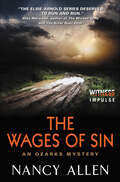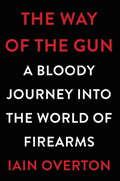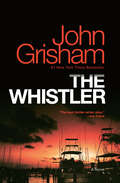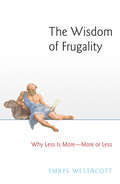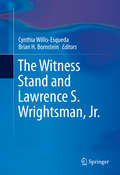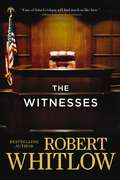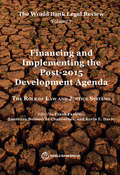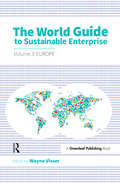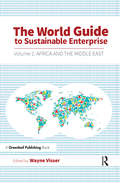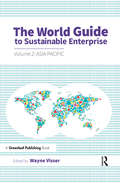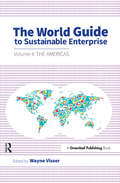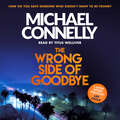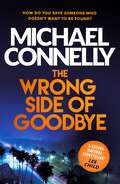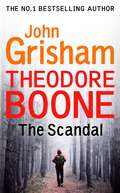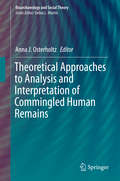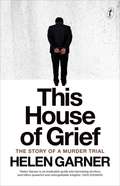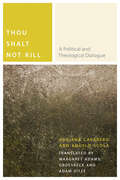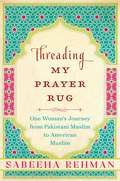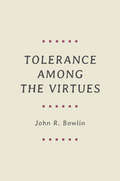- Table View
- List View
The Wages of Sin: An Ozarks Mystery (Ozarks Mysteries)
by Nancy Allen“The Elsie Arnold series deserves to run and run.”— Alex Marwood, author of The Wicked Girls and The Killer Next DoorIn rural McCown County, Missouri, a young pregnant woman is found beaten to death in a trailer park. The only witness to the murder is Ivy, her six-year-old daughter, who points to her mom’s boyfriend—father of the unborn child. County prosecutor Madeleine Thompson promises the community justice, and in the Ozarks, that can only mean one thing: a death sentence.When Madeleine’s first choice for co-counsel declines to try a death penalty case, she is forced to turn to assistant prosecutor Elsie Arnold. Elsie is reluctant to join forces with her frosty boss, but the road to conviction seems smooth—until unexpected facts about the victim arise, and the testimony of the lone eyewitness Ivy becomes increasingly crucial. Against Elsie’s advice, Madeleine brings in the state attorney general’s office to assist them, while cutthroat trial attorney Claire O’Hara joins the defense.Elsie will not let the power of prosecution—of seeking justice—be wrested from her without a fight. She wants to win the case, and to avenge the death of the mother and her unborn child. But as the trial nears, Elsie begins to harbor doubts about the death penalty itself. Meanwhile, the child Ivy is in greater danger than anyone knows.“Unflinching and gritty.” — Library Journal
The Way of the Gun: A Bloody Journey into the World of Firearms
by Iain OvertonA "riveting," "relentlessly engrossing," and "brilliantly researched" investigation of the life of the gun -- its manufacture, its sale, and its impact -- and of our world's hugely complex relationship with firearms.In some places of the world, getting a gun is easier than getting a glass of water. In some parts of the world, an individual is allowed to carry concealed firearms into schools. In some parts of the world, there are more guns than people to shoot them. There are almost 1 billion guns across the globe today, a shocking number that is higher than ever before in history. Each year, 12 billion bullets are produced -- almost two bullets for every person on the planet. And over 300,000 people are shot dead over an average year worldwide. In The Way of the Gun award-winning investigative journalist Iain Overton takes readers on a shocking and eye-opening journey to over 25 cities all across the globe, from Cape Town to Tokyo, from San Pedro Sula to Phnom Penh, along the way encountering people from all walks of life affected by guns: Zionist anti-terror gun trainers; El Salvadoran gangland killers; porn starlets who appear as snipers in triple-X films; and South African doctors soaked in the blood of gunshot victims -- unearthing some hard truths about the terrible realities of war and gun crime. Harrowing and sobering, this riveting expose on the long-reaching and mostly unknown life of a gun is an essential and important book in today's world.From the Hardcover edition.
The Whistler: A Novel (The Whistler #1)
by John Grisham#1 NEW YORK TIMES BESTSELLER • A high-stakes thrill ride through the darkest corners of the Sunshine State, from the author hailed as &“the best thriller writer alive&” by Ken Follett &“Riveting . . . an elaborate conspiracy.&”—The New York Times Book Review We expect our judges to be honest and wise. Their integrity is the bedrock of the entire judicial system. We trust them to ensure fair trials, to protect the rights of all litigants, to punish those who do wrong, and to oversee the flow of justice. But what happens when a judge bends the law or takes a bribe? Lacy Stoltz is an investigator for the Florida Board on Judicial Conduct. It is her job to respond to complaints dealing with judicial misconduct. After nine years with the Board, she knows that most problems are caused by incompetence, not corruption. But a corruption case eventually crosses her desk. A previously disbarred lawyer is back in business, and he claims to know of a Florida judge who has stolen more money than all other crooked judges combined. And not just crooked judges in Florida. All judges, from all states, and throughout United States history. And now he wants to put a stop to it. His only client is a person who knows the truth and wants to blow the whistle and collect millions under Florida law. When the case is assigned to Lacy, she immediately suspects that this one could be dangerous. Dangerous is one thing. Deadly is something else.
The Whistler: The Number One Bestseller
by John GrishamThe most corrupt judge in US history. A young investigator with a secret informant. The electrifying new thriller. Lacy Stoltz never expected to be in the firing line. Investigating judicial misconduct by Florida's one thousand judges, her cases so far have been relatively unexciting. That's until she meets Greg Myers, an indicted lawyer with an assumed name, who has an extraordinary tale to tell.Myers is representing a whistle blower who knows of a judge involved in organised crime. Along with her gangster associates this judge has facilitated the building of a casino on an Indian reservation. At least two people who opposed the scheme are dead. Since the casino was built, the judge has made several fortunes off undeclared winnings. She owns property around the world, hires private jets to take her where she wishes, and her secret vaults are overflowing with rare books, art and jewels.No one has a clue what she's been doing - until now.Under Florida law, those who help the state recover illegally acquired assets stand to gain a large percentage of them. Myers and his whistle blower friend could make millions.But first they need Lacy to start an investigation. Is she ready to pit herself against the most corrupt judge in American history, a judge whose associates think nothing of murder?(P)2016 Random House Audio
The Whistler: The unputdownable crime thriller from the number 1 Sunday Times bestselling author
by John GrishamWHO JUDGES A JUDGE?A corrupt judge is getting away with murder.Lacy Stoltz investigates judicial misconduct in Florida. When she meets Greg Meyers, an indicted lawyer, he tells her a secret that will put her in the firing line.Myers has dirt on a judge in league with organised crime who had forced through legislation to build a casino on a Native American reservation. Anyone who opposed the crooked scheme is dead. Now, Myers wants Lacy to make the judge's crimes public.But if she does, Lacy will be gambling with her life...💥350+ million copies, 45 languages, 10 blockbuster films: JOHN GRISHAM IS THE MASTER OF THE LEGAL THRILLER💥Praise for The Whistler:'A real page turner' ⭐ ⭐ ⭐ ⭐ ⭐ 'I was captivated from beginning to end' ⭐ ⭐ ⭐ ⭐ ⭐ 'If I could have given this book 10 stars I would've done!'⭐ ⭐ ⭐ ⭐ ⭐ 'Grisham never disappoints - a great story'⭐ ⭐ ⭐ ⭐ ⭐
The Wisdom of Frugality: Why Less Is More - More or Less
by Emrys WestacottFrom Socrates to Thoreau, most philosophers, moralists, and religious leaders have seen frugality as a virtue and have associated simple living with wisdom, integrity, and happiness. But why? And are they right? Is a taste for luxury fundamentally misguided? If one has the means to be a spendthrift, is it foolish or reprehensible to be extravagant?In this book, Emrys Westacott examines why, for more than two millennia, so many philosophers and people with a reputation for wisdom have been advocating frugality and simple living as the key to the good life. He also looks at why most people have ignored them, but argues that, in a world facing environmental crisis, it may finally be time to listen to the advocates of a simpler way of life.The Wisdom of Frugality explores what simplicity means, why it's supposed to make us better and happier, and why, despite its benefits, it has always been such a hard sell. The book looks not only at the arguments in favor of living frugally and simply, but also at the case that can be made for luxury and extravagance, including the idea that modern economies require lots of getting and spending.A philosophically informed reflection rather than a polemic, The Wisdom of Frugality ultimately argues that we will be better off--as individuals and as a society--if we move away from the materialistic individualism that currently rules.
The Witness Stand and Lawrence S. Wrightsman, Jr.
by Brian H. Bornstein Cynthia Willis-EsquedaThis unique volume salutes the work of pioneering forensic psychologist Lawrence S. Wrightsman, Jr. , by presenting current theorizing and research findings on issues that define the field of psychology and law. Ongoing topics in witness behaviors, suspect identification, and juror decision making illustrate how psychology and law complement and also conflict at various stages in legal processes. The book also sheds light on evolving areas such as DNA exonerations, professional trial consulting, and jury selection strategies, and the distinct challenges and opportunities these issues present. Noted contributors to the book include Wrightsman himself, who offers salient observations on the field that he continues to inspire. Featured among the topics: The credibility of witnesses. Psychological science on eyewitness identification and the U. S. Supreme Court. False confessions, from colonial Salem to today. Identifying juror bias: toward a new generation of jury selection research. Law and social science: how interdisciplinary is interdisciplinary enough? Race and its place in the American legal system. With its diverse mix of perspectives and methodologies, The Witness Stand and Lawrence S. Wrightsman, Jr. will interest forensic researchers in academic and applied settings, as well as individuals working in the legal system, such as attorneys, judges and law enforcement personnel.
The Witnesses
by Robert WhitlowYoung lawyer Parker House is on the rise--until his grandfather's mysterious past puts both of their lives in danger. Parker House's secret inheritance is either his greatest blessing . . . or his deadliest curse. The fresh-faced North Carolina attorney shares his German grandfather's uncanny ability to see future events in his mind's eye--a gift that has haunted 82-year-old Frank House through decades of trying to erase a murderous wartime past. While Parker navigates the intrigue and politics of small-town courtroom law, Frank is forced to face his darkest regrets. Then, a big career break for Parker collides with a new love he longs to nurture and the nightmares his grandfather can no longer escape. Sudden peril threatens to shatter not only Parker's legal prospects but also his life and the lives of those dearest to him. Two witnesses, two paths, an uncertain future.
The World Bank Legal Review, Volume 7 Financing and Implementing the Post-2015 Development Agenda: The Role of Law and Justice Systems
by Kevin E. Davis Laurence Boisson de Chazournes Frank FarielloThe newly adopted post-2015 development agenda is centered on 17 sustainable development goals to be reached by 2030. This volume of the World Bank Legal Review looks at how law and justice systems can support the financing and implementation of these goals, including the role of the rule of law and economic and social rights. The contributors, including legal scholars, development practitioners, and financial experts, analyze the goals, explore ways in which they can be achieved, and examine ways that recent relevant law and justice programs have worked. A wide array of topics are covered, from the legal aspects of collecting and monitoring vital data, to improving legal identity programs, to creating innovative health care regulation, to legal and judicial reform, to providing private sector "financing of public education projects to the provision of global public goods. Additionally, a special section on Europe looks at financial crisis management, enforcement of court decisions and the workings of the European Court of Justice. The opportunities and challenges of the 2030 agenda are many. This volume looks at both from multiple perspectives, demonstrating how sustainable development can go forward in a way in which everyone benefits.
The World Guide to Sustainable Enterprise - Volume 3: Europe
by Wayne VisserThe World Guide to Sustainable Enterprise is the first comprehensive global compendium that clearly describes the national approaches to sustainable enterprise. Through a systematic review of each country, this quick-to-access reference guide showcases the similarities and differences in each region. Every country profile includes key information about the relevant history, country-specific issues, trends, research, and the leading organizations operating in the field as well as best-practice case studies. The guide comprises four volumes, each dedicated to a specific region of the world. In a world where organizations are working increasingly across national and regional boundaries and research takes a joined-up and international approach, this book is an essential guide for practitioners and researchers in the disciplines of business sustainability, social enterprise and corporate responsibility. The first of its kind, this reference book provides the reader with a unique insight into what is the current state-of-play in each country. Each edited volume provides expert contributions from around the world; the contributors have been selected on the basis of their knowledge of the country and their clear experience in sustainable enterprise. Each regional/country profile includes the following subsections: Sustainable Enterprise in context; Priority issues; Trends; Government policies; Case studies; Further resources; and References. This unique resource will be an essential acquisition for all organizations who need to benchmark their sustainable enterprise strategies throughout different regions and cultures and want the best possible intelligence on the key issues and concerns relating to sustainable business and social responsibility in all of the markets in which they operate. It provides a useful companion reference collection to the World Guide to CSR, also edited by Wayne Visser. The full Four Volume Set of The World Guide to Sustainable Enterprise is available for purchase as a single item at a 25% discounted rate.
The World Guide to Sustainable Enterprise: Volume 1: Africa and Middle East
by Wayne VisserThe World Guide to Sustainable Enterprise is the first comprehensive global compendium that clearly describes the national approaches to sustainable enterprise. Through a systematic review of each country, this quick-to-access reference guide showcases the similarities and differences in each region. Every country profile includes key information about the relevant history, country-specific issues, trends, research, and the leading organizations operating in the field as well as best-practice case studies. The guide comprises four volumes, each dedicated to a specific region of the world. In a world where organizations are working increasingly across national and regional boundaries and research takes a joined-up and international approach, this book is an essential guide for practitioners and researchers in the disciplines of business sustainability, social enterprise and corporate responsibility. The first of its kind, this reference book provides the reader with a unique insight into what is the current state-of-play in each country. Each edited volume provides expert contributions from around the world; the contributors have been selected on the basis of their knowledge of the country and their clear experience in sustainable enterprise. Each regional/country profile includes the following subsections: Sustainable Enterprise in context; Priority issues; Trends; Government policies; Case studies; Further resources; and References. This unique resource will be an essential acquisition for all organizations who need to benchmark their sustainable enterprise strategies throughout different regions and cultures and want the best possible intelligence on the key issues and concerns relating to sustainable business and social responsibility in all of the markets in which they operate. It provides a useful companion reference collection to The World Guide to CSR, also edited by Wayne Visser. The full Four Volume Set of The World Guide to Sustainable Enterprise is available for purchase as a single item at a 25% discounted rate.
The World Guide to Sustainable Enterprise: Volume 2: Asia Pacific
by Wayne VisserThe World Guide to Sustainable Enterprise is the first comprehensive global compendium that clearly describes the national approaches to sustainable enterprise. Through a systematic review of each country, this quick-to-access reference guide showcases the similarities and differences in each region. Every country profile includes key information about the relevant history, country-specific issues, trends, research, and the leading organizations operating in the field as well as best-practice case studies. The guide comprises four volumes, each dedicated to a specific region of the world. In a world where organizations are working increasingly across national and regional boundaries and research takes a joined-up and international approach, this book is an essential guide for practitioners and researchers in the disciplines of business sustainability, social enterprise and corporate responsibility. The first of its kind, this reference book provides the reader with a unique insight into what is the current state-of-play in each country. Each edited volume provides expert contributions from around the world; the contributors have been selected on the basis of their knowledge of the country and their clear experience in sustainable enterprise. Each regional/country profile includes the following subsections: Sustainable Enterprise in context; Priority issues; Trends; Government policies; Case studies; Further resources; and References. This unique resource will be an essential acquisition for all organizations who need to benchmark their sustainable enterprise strategies throughout different regions and cultures and want the best possible intelligence on the key issues and concerns relating to sustainable business and social responsibility in all of the markets in which they operate. It provides a useful companion reference collection to the World Guide to CSR, also edited by Wayne Visser. The full Four Volume Set of The World Guide to Sustainable Enterprise is available for purchase as a single item at a 25% discounted rate.
The World Guide to Sustainable Enterprise: Volume 4: the Americas
by Wayne VisserThe World Guide to Sustainable Enterprise is the first comprehensive global compendium that clearly describes the national approaches to sustainable enterprise. Through a systematic review of each country, this quick-to-access reference guide showcases the similarities and differences in each region. Every country profile includes key information about the relevant history, country-specific issues, trends, research, and the leading organizations operating in the field as well as best-practice case studies. The guide comprises four volumes, each dedicated to a specific region of the world. In a world where organizations are working increasingly across national and regional boundaries and research takes a joined-up and international approach, this book is an essential guide for practitioners and researchers in the disciplines of business sustainability, social enterprise and corporate responsibility. The first of its kind, this reference book provides the reader with a unique insight into what is the current state-of-play in each country. Each edited volume provides expert contributions from around the world; the contributors have been selected on the basis of their knowledge of the country and their clear experience in sustainable enterprise. Each regional/country profile includes the following subsections: Sustainable Enterprise in context; Priority issues; Trends; Government policies; Case studies; Further resources; and References. This unique resource will be an essential acquisition for all organizations who need to benchmark their sustainable enterprise strategies throughout different regions and cultures and want the best possible intelligence on the key issues and concerns relating to sustainable business and social responsibility in all of the markets in which they operate. It provides a useful companion reference collection to the World Guide to CSR, also edited by Wayne Visser. The full Four Volume Set of The World Guide to Sustainable Enterprise is available for purchase as a single item at a 25% discounted rate.
The Wrong Side of Goodbye (Harry Bosch Series #19)
by Michael ConnellyOnly Harry Bosch can uncover LA's darkest secrets in this new gripping thriller from global bestseller Michael Connelly. Read by Titus Welliver, star of BOSCH.'What do you want me to do?' Bosch asked again.'I want you to find someone for me,' Vance said. 'Someone who might not have ever existed.'Harry Bosch is working as a part-time detective in the town of San Fernando outside of Los Angeles, when he gets the invitation to meet with the ageing aviation billionaire Whitney Vance. When he was eighteen Vance had a relationship with a Mexican girl called Vibiana Duarte, but soon after becoming pregnant she disappeared.Now, as he reaches the end of his life, Vance wants to know what happened to Vibiana and whether there is an heir to his vast fortune. And Bosch is the only person he trusts to undertake the assignment.Harry's aware that with such sums of money involved, this could be a dangerous undertaking - not just for himself, but for the person he's looking for - but as he begins to uncover Vibiana's tragic story, and finds uncanny links to his own past, he knows he cannot rest until he finds the truth.(p) 2016 Hachette Audio
The Wrong Side of Goodbye (Harry Bosch Series #19)
by Michael ConnellyOnly Harry Bosch can uncover LA's darkest secrets in this new gripping thriller from global bestseller Michael Connelly.'What do you want me to do?' Bosch asked again.'I want you to find someone for me,' Vance said. 'Someone who might not have ever existed.'Harry Bosch is working as a part-time detective in the town of San Fernando outside of Los Angeles, when he gets the invitation to meet with the ageing aviation billionaire Whitney Vance. When he was eighteen Vance had a relationship with a Mexican girl called Vibiana Duarte, but soon after becoming pregnant she disappeared.Now, as he reaches the end of his life, Vance wants to know what happened to Vibiana and whether there is an heir to his vast fortune. And Bosch is the only person he trusts to undertake the assignment.Harry's aware that with such sums of money involved, this could be a dangerous undertaking - not just for himself, but for the person he's looking for - but as he begins to uncover Vibiana's tragic story, and finds uncanny links to his own past, he knows he cannot rest until he finds the truth.
Theodore Boone: Theodore Boone 6 (Theodore Boone)
by John Grisham'I'm the lawyer, and you're the client. My advice to you is to bury this and not tell a soul. Never. Got it?'Theodore Boone, courtroom hero and the only kid lawyer in town, is facing a tough week at school with his exams.But things take a turn for the worse when a huge scandal is revealed - by none other than his best friend, April. And when April makes a decision that Theodore advises against, the scandal suddenly blows up and is all over the news. Their futures are on the line and April's running scared. Can Theodore find a way to reverse the damage and save several lives from ruin?***********************What readers are saying about THEODORE BOONE: THE SCANDAL'A great story' - 5 stars'Fantastic' - 5 stars'John Grisham at his best' - 5 stars'Excellent - another great book by John Grisham' - 5 stars'An excellent read, as usual' - 5 stars
Theodore Boone: Theodore Boone 6 (Theodore Boone)
by John Grisham'I'm the lawyer, and you're the client. My advice to you is to bury this and not tell a soul. Never. Got it?'Theodore Boone, courtroom hero and the only kid lawyer in town, is facing a tough week at school with his exams.But things take a turn for the worse when a huge scandal is revealed - by none other than his best friend, April. And when April makes a decision that Theodore advises against, the scandal suddenly blows up and is all over the news. Their futures are on the line and April's running scared. Can Theodore find a way to reverse the damage and save several lives from ruin?(P)2016 Listening Library
Theoretical Approaches to Analysis and Interpretation of Commingled Human Remains
by Anna J. OsterholtzThis volume centers on the application of social theory to commingled remains with special focus on the cultural processes that create the assemblages as a way to better understand issues of meaning, social structure and interaction, and lived experience in the past. The importance of the application of theoretical frameworks to bioarchaeology in general has been recognized, but commingled and fragmentary assemblages require an increased theoretical focus. Too often these assemblages are still relegated to appendices; they are analytical puzzles that need the interpretive power offered by social theory. Theoretical Approaches to Analysis and Interpretation of Commingled Human Remains provides case studies that illustrate how an appropriate theoretical model can be used with commingled and fragmentary remains to add to overall site and population level interpretations of past and present peoples. Specifically, the contributions show a blending and melding of different social theories, highlighting the broad interpretive power of social theory. Contributors are drawn from both the Old and New World. Temporally, time periods from the Neolithic to historic periods are present, further widening the audience for the volume.
This House of Grief: The Story of a Murder Trial
by Helen GarnerWinner of the NED KELLY AWARD, BEST TRUE CRIME BOOK, 2016. On Father's Day 2005, three young boys drowned when the car their father was driving went off the road and plunged into a dam. Was it an accident or was it an intentional act of vengeance against his ex-wife for taking most of his material goods in a divorce and taking up with a new man? Is he innocent or guilty? That was the subject of the his two trials the author attended. Her description and analysis of this case, its participants, and human behavior will astonish you.
Thomas Aquinas on War and Peace
by Gregory M. ReichbergInquiring 'whether any war can be just', Thomas Aquinas famously responded that this may hold true, provided the war is conducted by a legitimate authority, for a just cause, and with an upright intention. Virtually all accounts of just war, from the Middle Ages to the current day, make reference to this threefold formula. But due in large measure to its very succinctness, Aquinas's theory has prompted contrasting interpretations. This book sets the record straight by surveying the wide range of texts in his literary corpus that have bearing on peace and the ethics of war. Thereby emerges a coherent and nuanced picture of just war as set within his systematic moral theory. It is shown how Aquinas deftly combined elements from earlier authors, and how his teaching has fruitfully propelled inquiry on this important topic by his fellow scholastics, later legal theorists such as Grotius, and contemporary philosophers of just war.
Thou Shalt Not Kill: A Political and Theological Dialogue (Commonalities)
by Adriana Cavarero Angelo ScolaIn this fascinating and rare little book, a leading Italian feminist philosopher and the Archbishop of Milan face off over the contemporary meaning of the biblical commandment not to kill.The result is a series of erudite and wide-ranging arguments that move from murder and suicide to just war and drone strikes, from bioethics and biopolitics to hermeneutics and philology, from Theodor Adorno and Max Horkheimer to Hannah Arendt and Michel Foucault, from Torah and Scripture to art and literature, from the essence of human dignity and the paradoxes of fratricide to engagements with Levinasian ethics.Less a direct debate than a disputation in the classical sense, Thou Shalt Not Kill proves to be a searching meditation on one of the unstated moral premises shared by otherwise bitterly opposed political factions. It will stimulate the mind of the novice while also reminding more advanced readers of the necessity and desirability of thinking in the present.
Threading My Prayer Rug: One Woman's Journey from Pakistani Muslim to American Muslim
by Sabeeha RehmanONE OF BOOKLIST'S TOP TEN RELIGION AND SPIRITUALITY BOOKS OF 2016ONE OF BOOKLIST'S TOP TEN DIVERSE NONFICTION BOOKS OF 2017Honorable Mention in the 2017 San Francisco Book Festival Awards, Spiritual CategoryThis enthralling story of the making of an American is also a timely meditation on being Muslim in America today.Threading My Prayer Rug is a richly textured reflection on what it is to be a Muslim in America today. It is also the luminous story of many journeys: from Pakistan to the United States in an arranged marriage that becomes a love match lasting forty years; from secular Muslim in an Islamic society to devout Muslim in a society ignorant of Islam, and from liberal to conservative to American Muslim; from student to bride and mother; and from an immigrant intending to stay two years to an American citizen, business executive, grandmother, and tireless advocate for interfaith understanding.Beginning with a sweetly funny, moving account of her arranged marriage, the author undercuts stereotypes and offers the refreshing view of an American life through Muslim eyes. In chapters leavened with humor, hope, and insight, she recounts an immigrant’s daily struggles balancing assimilation with preserving heritage, overcoming religious barriers from within and distortions of Islam from without, and confronting issues of raising her children as Muslims-while they lobby for a Christmas tree! Sabeeha Rehman was doing interfaith work for Imam Feisal Abdul Rauf, the driving force behind the Muslim community center at Ground Zero, when the backlash began. She discusses what that experience revealed about American society.
To Fix or To Heal: Patient Care, Public Health, and the Limits of Biomedicine (Biopolitics #3)
by Joseph E. Davis Ana Marta GonzálezDo doctors fix patients? Or do they heal them? For all of modern medicine’s many successes, discontent with the quality of patient care has combined with a host of new developments, from aging populations to the resurgence of infectious diseases, which challenge medicine’s overreliance on narrowly mechanistic and technical methods of explanation and intervention, or “fixing’ patients. The need for a better balance, for more humane “healing” rationales and practices that attend to the social and environmental aspects of health and illness and the experiencing person, is more urgent than ever. Yet, in public health and bioethics, the fields best positioned to offer countervailing values and orientations, the dominant approaches largely extend and reinforce the reductionism and individualism of biomedicine.The collected essays in To Fix or To Heal do more than document the persistence of reductionist approaches and the attendant extension of medicalization to more and more aspects of our lives. The contributors also shed valuable light on why reductionism has persisted and why more holistic models, incorporating social and environmental factors, have gained so little traction. The contributors examine the moral appeal of reductionism, the larger rationalist dream of technological mastery, the growing valuation of health, and the enshrining of individual responsibility as the seemingly non-coercive means of intervention and control. This paradigm-challenging volume advances new lines of criticism of our dominant medical regime, even while proposing ways of bringing medical practice, bioethics, and public health more closely into line with their original goals. Precisely because of the centrality of the biomedical approach to our society, the contributors argue, challenging the reductionist model and its ever-widening effects is perhaps the best way to press for a much-needed renewal of our ethical and political discourse.
To Whom Do Children Belong?
by Melissa MoschellaMost people believe that parents have rights to direct their children's education and upbringing. But why? What grounds those rights? How broad is their scope? Can we defend parental rights against those who believe we need more extensive state educational control to protect children's autonomy or prepare them for citizenship in a diverse society? Amid heated debates over issues like sexual education, diversity education and vouchers, Moschella cuts to the heart of the matter, explaining why education is primarily the responsibility of parents, not the state. Rigorously argued yet broadly accessible, the book offers a principled case for expanding school choice and granting exemptions when educational programs or regulations threaten parents' ability to raise their children in line with their values. Philosophical argument is complemented with psychological and social scientific research showing that robust parental rights' protections are crucial for the well-being of parents, children and society as a whole.
Tolerance among the Virtues
by John R. BowlinIn a pluralistic society such as ours, tolerance is a virtue--but it doesn't always seem so. Some suspect that it entangles us in unacceptable moral compromises and inequalities of power, while others dismiss it as mere political correctness or doubt that it can safeguard the moral and political relationships we value. Tolerance among the Virtues provides a vigorous defense of tolerance against its many critics and shows why the virtue of tolerance involves exercising judgment across a variety of different circumstances and relationships--not simply applying a prescribed set of rules.Drawing inspiration from St. Paul, Aquinas, and Wittgenstein, John Bowlin offers a nuanced inquiry into tolerance as a virtue. He explains why the advocates and debunkers of toleration have reached an impasse, and he suggests a new way forward by distinguishing the virtue of tolerance from its false look-alikes, and from its sibling, forbearance. Some acts of toleration are right and good, while others amount to indifference, complicity, or condescension. Some persons are able to draw these distinctions well and to act in accord with their better judgment. When we praise them as tolerant, we are commending them as virtuous. Bowlin explores what that commendation means.Tolerance among the Virtues offers invaluable insights into how to live amid differences we cannot endorse--beliefs we consider false, actions we think are unjust, institutional arrangements we consider cruel or corrupt, and persons who embody what we oppose.
